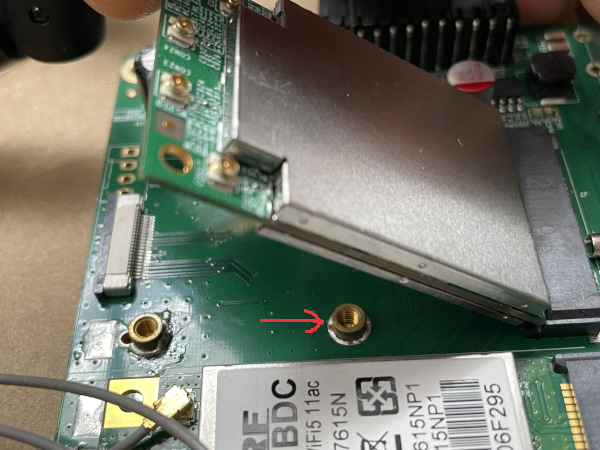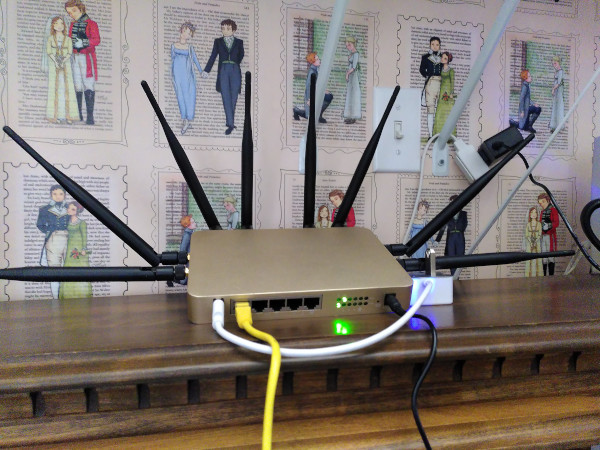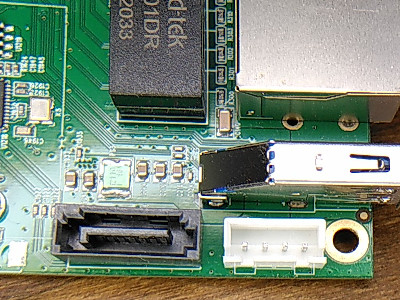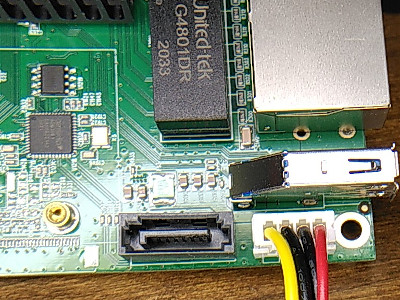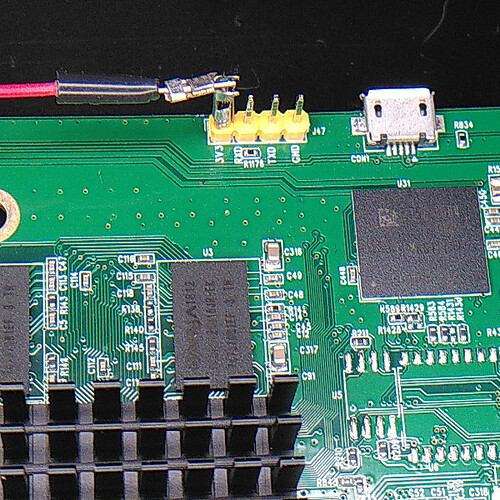@DDK My apologies to you also for taking so long to get back to you. Here's the output you asked for. In the below, wl0 is the built-in 2.4G on a 7622 and wl1 is the AsiaRF AW7915-NP1. Neither support DBDC. I don't actually have my AsiaRF MT7615N board (the only board I have that does support DBDC) plugged into anything at the moment. If you are interested in its output still, let me know, and I'll get it for you.
root@thor:~# iw phy
Wiphy wl1
wiphy index: 1
max # scan SSIDs: 4
max scan IEs length: 2186 bytes
max # sched scan SSIDs: 0
max # match sets: 0
Retry short limit: 7
Retry long limit: 4
Coverage class: 1 (up to 450m)
Device supports AP-side u-APSD.
Device supports T-DLS.
Available Antennas: TX 0xf RX 0xf
Configured Antennas: TX 0xf RX 0xf
Supported interface modes:
* IBSS
* managed
* AP
* AP/VLAN
* monitor
* mesh point
* P2P-client
* P2P-GO
Band 1:
Capabilities: 0x9ff
RX LDPC
HT20/HT40
SM Power Save disabled
RX Greenfield
RX HT20 SGI
RX HT40 SGI
TX STBC
RX STBC 1-stream
Max AMSDU length: 7935 bytes
No DSSS/CCK HT40
Maximum RX AMPDU length 65535 bytes (exponent: 0x003)
Minimum RX AMPDU time spacing: 4 usec (0x05)
HT TX/RX MCS rate indexes supported: 0-31
HE Iftypes: managed
HE MAC Capabilities (0x08011a000040):
+HTC HE Supported
Trigger Frame MAC Padding Duration: 2
OM Control
Maximum A-MPDU Length Exponent: 3
A-MSDU in A-MPDU
HE PHY Capabilities: (0x22700e126d00f3164e3f00):
HE40/2.4GHz
242 tone RUs/2.4GHz
Device Class: 1
LDPC Coding in Payload
HE SU PPDU with 1x HE-LTF and 0.8us GI
NDP with 4x HE-LTF and 3.2us GI
STBC Tx <= 80MHz
STBC Rx <= 80MHz
DCM Max Constellation: 2
DCM Max Constellation Rx: 2
SU Beamformee
Beamformee STS <= 80Mhz: 3
Beamformee STS > 80Mhz: 3
Codebook Size SU Feedback
Codebook Size MU Feedback
Triggered CQI Feedback
Partial Bandwidth Extended Range
Partial Bandwidth DL MU-MIMO
PPE Threshold Present
Power Boost Factor ar
HE SU PPDU & HE PPDU 4x HE-LTF 0.8us GI
Max NC: 2
20MHz in 40MHz HE PPDU 2.4GHz
20MHz in 160/80+80MHz HE PPDU
80MHz in 160/80+80MHz HE PPDU
DCM Max BW: 1
Longer Than 16HE SIG-B OFDM Symbols
Non-Triggered CQI Feedback
TX 1024-QAM
RX 1024-QAM
RX Full BW SU Using HE MU PPDU with Compression SIGB
RX Full BW SU Using HE MU PPDU with Non-Compression SIGB
HE RX MCS and NSS set <= 80 MHz
1 streams: MCS 0-11
2 streams: MCS 0-11
3 streams: MCS 0-11
4 streams: MCS 0-11
5 streams: not supported
6 streams: not supported
7 streams: not supported
8 streams: not supported
HE TX MCS and NSS set <= 80 MHz
1 streams: MCS 0-11
2 streams: MCS 0-11
3 streams: MCS 0-11
4 streams: MCS 0-11
5 streams: not supported
6 streams: not supported
7 streams: not supported
8 streams: not supported
PPE Threshold 0x3b 0x1c 0xc7 0x71 0x1c 0xc7 0x71 0x1c 0xc7 0x71
EHT Iftypes: managed
EHT MAC Capabilities (0x0000):
EHT PHY Capabilities: (0x0000000000000000):
EHT MCS/NSS: (0x):
EHT bw=20 MHz, max NSS for MCS 0-7: Rx=0, Tx=0
EHT bw=20 MHz, max NSS for MCS 8-9: Rx=0, Tx=0
EHT bw=20 MHz, max NSS for MCS 10-11: Rx=0, Tx=0
EHT bw=20 MHz, max NSS for MCS 12-13: Rx=0, Tx=0
HE Iftypes: AP
HE MAC Capabilities (0x00051a081044):
+HTC HE Supported
TWT Responder
BSR
OM Control
Maximum A-MPDU Length Exponent: 3
BQR
A-MSDU in A-MPDU
OM Control UL MU Data Disable RX
HE PHY Capabilities: (0x02200e926f0baf10000c00):
HE40/2.4GHz
LDPC Coding in Payload
NDP with 4x HE-LTF and 3.2us GI
STBC Tx <= 80MHz
STBC Rx <= 80MHz
DCM Max Constellation: 2
DCM Max Constellation Rx: 2
SU Beamformer
SU Beamformee
MU Beamformer
Beamformee STS <= 80Mhz: 3
Beamformee STS > 80Mhz: 3
Sounding Dimensions <= 80Mhz: 3
Sounding Dimensions > 80Mhz: 1
Codebook Size SU Feedback
Codebook Size MU Feedback
Triggered SU Beamforming Feedback
Triggered MU Beamforming Feedback
Partial Bandwidth Extended Range
PPE Threshold Present
Max NC: 2
TX 1024-QAM
RX 1024-QAM
HE RX MCS and NSS set <= 80 MHz
1 streams: MCS 0-11
2 streams: MCS 0-11
3 streams: MCS 0-11
4 streams: MCS 0-11
5 streams: not supported
6 streams: not supported
7 streams: not supported
8 streams: not supported
HE TX MCS and NSS set <= 80 MHz
1 streams: MCS 0-11
2 streams: MCS 0-11
3 streams: MCS 0-11
4 streams: MCS 0-11
5 streams: not supported
6 streams: not supported
7 streams: not supported
8 streams: not supported
PPE Threshold 0x3b 0x1c 0xc7 0x71 0x1c 0xc7 0x71 0x1c 0xc7 0x71
EHT Iftypes: AP
EHT MAC Capabilities (0x0000):
EHT PHY Capabilities: (0x0000000000000000):
EHT MCS/NSS: (0x):
EHT bw=20 MHz, max NSS for MCS 0-7: Rx=0, Tx=0
EHT bw=20 MHz, max NSS for MCS 8-9: Rx=0, Tx=0
EHT bw=20 MHz, max NSS for MCS 10-11: Rx=0, Tx=0
EHT bw=20 MHz, max NSS for MCS 12-13: Rx=0, Tx=0
HE Iftypes: mesh point
HE MAC Capabilities (0x00011a000040):
+HTC HE Supported
OM Control
Maximum A-MPDU Length Exponent: 3
A-MSDU in A-MPDU
HE PHY Capabilities: (0x02200c0000000000008000):
HE40/2.4GHz
LDPC Coding in Payload
STBC Tx <= 80MHz
STBC Rx <= 80MHz
HE RX MCS and NSS set <= 80 MHz
1 streams: MCS 0-11
2 streams: MCS 0-11
3 streams: MCS 0-11
4 streams: MCS 0-11
5 streams: not supported
6 streams: not supported
7 streams: not supported
8 streams: not supported
HE TX MCS and NSS set <= 80 MHz
1 streams: MCS 0-11
2 streams: MCS 0-11
3 streams: MCS 0-11
4 streams: MCS 0-11
5 streams: not supported
6 streams: not supported
7 streams: not supported
8 streams: not supported
EHT Iftypes: mesh point
EHT MAC Capabilities (0x0000):
EHT PHY Capabilities: (0x0000000000000000):
EHT MCS/NSS: (0x):
EHT bw=20 MHz, max NSS for MCS 0-7: Rx=0, Tx=0
EHT bw=20 MHz, max NSS for MCS 8-9: Rx=0, Tx=0
EHT bw=20 MHz, max NSS for MCS 10-11: Rx=0, Tx=0
EHT bw=20 MHz, max NSS for MCS 12-13: Rx=0, Tx=0
Frequencies:
* 2412 MHz [1] (29.0 dBm)
* 2417 MHz [2] (29.0 dBm)
* 2422 MHz [3] (29.0 dBm)
* 2427 MHz [4] (29.0 dBm)
* 2432 MHz [5] (29.0 dBm)
* 2437 MHz [6] (29.0 dBm)
* 2442 MHz [7] (29.0 dBm)
* 2447 MHz [8] (29.0 dBm)
* 2452 MHz [9] (29.0 dBm)
* 2457 MHz [10] (29.0 dBm)
* 2462 MHz [11] (29.0 dBm)
* 2467 MHz [12] (disabled)
* 2472 MHz [13] (disabled)
* 2484 MHz [14] (disabled)
Band 2:
Capabilities: 0x9ff
RX LDPC
HT20/HT40
SM Power Save disabled
RX Greenfield
RX HT20 SGI
RX HT40 SGI
TX STBC
RX STBC 1-stream
Max AMSDU length: 7935 bytes
No DSSS/CCK HT40
Maximum RX AMPDU length 65535 bytes (exponent: 0x003)
Minimum RX AMPDU time spacing: 4 usec (0x05)
HT TX/RX MCS rate indexes supported: 0-31
VHT Capabilities (0x339b79f9):
Max MPDU length: 7991
Supported Channel Width: 160 MHz, 80+80 MHz
RX LDPC
short GI (80 MHz)
short GI (160/80+80 MHz)
TX STBC
SU Beamformer
SU Beamformee
MU Beamformer
MU Beamformee
RX antenna pattern consistency
TX antenna pattern consistency
VHT RX MCS set:
1 streams: MCS 0-9
2 streams: MCS 0-9
3 streams: MCS 0-9
4 streams: MCS 0-9
5 streams: not supported
6 streams: not supported
7 streams: not supported
8 streams: not supported
VHT RX highest supported: 0 Mbps
VHT TX MCS set:
1 streams: MCS 0-9
2 streams: MCS 0-9
3 streams: MCS 0-9
4 streams: MCS 0-9
5 streams: not supported
6 streams: not supported
7 streams: not supported
8 streams: not supported
VHT TX highest supported: 0 Mbps
VHT extended NSS: supported
HE Iftypes: managed
HE MAC Capabilities (0x08011a000040):
+HTC HE Supported
Trigger Frame MAC Padding Duration: 2
OM Control
Maximum A-MPDU Length Exponent: 3
A-MSDU in A-MPDU
HE PHY Capabilities: (0x5c700e126d00f3164e3f00):
HE40/HE80/5GHz
HE160/5GHz
HE160/HE80+80/5GHz
242 tone RUs/5GHz
Device Class: 1
LDPC Coding in Payload
HE SU PPDU with 1x HE-LTF and 0.8us GI
NDP with 4x HE-LTF and 3.2us GI
STBC Tx <= 80MHz
STBC Rx <= 80MHz
DCM Max Constellation: 2
DCM Max Constellation Rx: 2
SU Beamformee
Beamformee STS <= 80Mhz: 3
Beamformee STS > 80Mhz: 3
Codebook Size SU Feedback
Codebook Size MU Feedback
Triggered CQI Feedback
Partial Bandwidth Extended Range
Partial Bandwidth DL MU-MIMO
PPE Threshold Present
Power Boost Factor ar
HE SU PPDU & HE PPDU 4x HE-LTF 0.8us GI
Max NC: 2
20MHz in 40MHz HE PPDU 2.4GHz
20MHz in 160/80+80MHz HE PPDU
80MHz in 160/80+80MHz HE PPDU
DCM Max BW: 1
Longer Than 16HE SIG-B OFDM Symbols
Non-Triggered CQI Feedback
TX 1024-QAM
RX 1024-QAM
RX Full BW SU Using HE MU PPDU with Compression SIGB
RX Full BW SU Using HE MU PPDU with Non-Compression SIGB
HE RX MCS and NSS set <= 80 MHz
1 streams: MCS 0-11
2 streams: MCS 0-11
3 streams: MCS 0-11
4 streams: MCS 0-11
5 streams: not supported
6 streams: not supported
7 streams: not supported
8 streams: not supported
HE TX MCS and NSS set <= 80 MHz
1 streams: MCS 0-11
2 streams: MCS 0-11
3 streams: MCS 0-11
4 streams: MCS 0-11
5 streams: not supported
6 streams: not supported
7 streams: not supported
8 streams: not supported
HE RX MCS and NSS set 160 MHz
1 streams: MCS 0-11
2 streams: MCS 0-11
3 streams: not supported
4 streams: not supported
5 streams: not supported
6 streams: not supported
7 streams: not supported
8 streams: not supported
HE TX MCS and NSS set 160 MHz
1 streams: MCS 0-11
2 streams: MCS 0-11
3 streams: not supported
4 streams: not supported
5 streams: not supported
6 streams: not supported
7 streams: not supported
8 streams: not supported
EHT Iftypes: managed
EHT MAC Capabilities (0x0000):
EHT PHY Capabilities: (0x0000000000000000):
EHT MCS/NSS: (0x):
EHT bw <= 80 MHz, max NSS for MCS 8-9: Rx=0, Tx=0
EHT bw <= 80 MHz, max NSS for MCS 10-11: Rx=0, Tx=0
EHT bw <= 80 MHz, max NSS for MCS 12-13: Rx=0, Tx=0
EHT bw=160 MHz, max NSS for MCS 8-9: Rx=0, Tx=0
EHT bw=160 MHz, max NSS for MCS 10-11: Rx=0, Tx=0
EHT bw=160 MHz, max NSS for MCS 12-13: Rx=0, Tx=0
HE Iftypes: AP
HE MAC Capabilities (0x00051a081044):
+HTC HE Supported
TWT Responder
BSR
OM Control
Maximum A-MPDU Length Exponent: 3
BQR
A-MSDU in A-MPDU
OM Control UL MU Data Disable RX
HE PHY Capabilities: (0x1c200e926f0baf10000c00):
HE40/HE80/5GHz
HE160/5GHz
HE160/HE80+80/5GHz
LDPC Coding in Payload
NDP with 4x HE-LTF and 3.2us GI
STBC Tx <= 80MHz
STBC Rx <= 80MHz
DCM Max Constellation: 2
DCM Max Constellation Rx: 2
SU Beamformer
SU Beamformee
MU Beamformer
Beamformee STS <= 80Mhz: 3
Beamformee STS > 80Mhz: 3
Sounding Dimensions <= 80Mhz: 3
Sounding Dimensions > 80Mhz: 1
Codebook Size SU Feedback
Codebook Size MU Feedback
Triggered SU Beamforming Feedback
Triggered MU Beamforming Feedback
Partial Bandwidth Extended Range
PPE Threshold Present
Max NC: 2
TX 1024-QAM
RX 1024-QAM
HE RX MCS and NSS set <= 80 MHz
1 streams: MCS 0-11
2 streams: MCS 0-11
3 streams: MCS 0-11
4 streams: MCS 0-11
5 streams: not supported
6 streams: not supported
7 streams: not supported
8 streams: not supported
HE TX MCS and NSS set <= 80 MHz
1 streams: MCS 0-11
2 streams: MCS 0-11
3 streams: MCS 0-11
4 streams: MCS 0-11
5 streams: not supported
6 streams: not supported
7 streams: not supported
8 streams: not supported
HE RX MCS and NSS set 160 MHz
1 streams: MCS 0-11
2 streams: MCS 0-11
3 streams: not supported
4 streams: not supported
5 streams: not supported
6 streams: not supported
7 streams: not supported
8 streams: not supported
HE TX MCS and NSS set 160 MHz
1 streams: MCS 0-11
2 streams: MCS 0-11
3 streams: not supported
4 streams: not supported
5 streams: not supported
6 streams: not supported
7 streams: not supported
8 streams: not supported
EHT Iftypes: AP
EHT MAC Capabilities (0x0000):
EHT PHY Capabilities: (0x0000000000000000):
EHT MCS/NSS: (0x):
EHT bw <= 80 MHz, max NSS for MCS 8-9: Rx=0, Tx=0
EHT bw <= 80 MHz, max NSS for MCS 10-11: Rx=0, Tx=0
EHT bw <= 80 MHz, max NSS for MCS 12-13: Rx=0, Tx=0
EHT bw=160 MHz, max NSS for MCS 8-9: Rx=0, Tx=0
EHT bw=160 MHz, max NSS for MCS 10-11: Rx=0, Tx=0
EHT bw=160 MHz, max NSS for MCS 12-13: Rx=0, Tx=0
HE Iftypes: mesh point
HE MAC Capabilities (0x00011a000040):
+HTC HE Supported
OM Control
Maximum A-MPDU Length Exponent: 3
A-MSDU in A-MPDU
HE PHY Capabilities: (0x1c200c0000000000008000):
HE40/HE80/5GHz
HE160/5GHz
HE160/HE80+80/5GHz
LDPC Coding in Payload
STBC Tx <= 80MHz
STBC Rx <= 80MHz
HE RX MCS and NSS set <= 80 MHz
1 streams: MCS 0-11
2 streams: MCS 0-11
3 streams: MCS 0-11
4 streams: MCS 0-11
5 streams: not supported
6 streams: not supported
7 streams: not supported
8 streams: not supported
HE TX MCS and NSS set <= 80 MHz
1 streams: MCS 0-11
2 streams: MCS 0-11
3 streams: MCS 0-11
4 streams: MCS 0-11
5 streams: not supported
6 streams: not supported
7 streams: not supported
8 streams: not supported
HE RX MCS and NSS set 160 MHz
1 streams: MCS 0-11
2 streams: MCS 0-11
3 streams: not supported
4 streams: not supported
5 streams: not supported
6 streams: not supported
7 streams: not supported
8 streams: not supported
HE TX MCS and NSS set 160 MHz
1 streams: MCS 0-11
2 streams: MCS 0-11
3 streams: not supported
4 streams: not supported
5 streams: not supported
6 streams: not supported
7 streams: not supported
8 streams: not supported
EHT Iftypes: mesh point
EHT MAC Capabilities (0x0000):
EHT PHY Capabilities: (0x0000000000000000):
EHT MCS/NSS: (0x):
EHT bw <= 80 MHz, max NSS for MCS 8-9: Rx=0, Tx=0
EHT bw <= 80 MHz, max NSS for MCS 10-11: Rx=0, Tx=0
EHT bw <= 80 MHz, max NSS for MCS 12-13: Rx=0, Tx=0
EHT bw=160 MHz, max NSS for MCS 8-9: Rx=0, Tx=0
EHT bw=160 MHz, max NSS for MCS 10-11: Rx=0, Tx=0
EHT bw=160 MHz, max NSS for MCS 12-13: Rx=0, Tx=0
Frequencies:
* 5180 MHz [36] (23.0 dBm)
* 5200 MHz [40] (23.0 dBm)
* 5220 MHz [44] (23.0 dBm)
* 5240 MHz [48] (23.0 dBm)
* 5260 MHz [52] (24.0 dBm) (radar detection)
* 5280 MHz [56] (24.0 dBm) (radar detection)
* 5300 MHz [60] (24.0 dBm) (radar detection)
* 5320 MHz [64] (24.0 dBm) (radar detection)
* 5500 MHz [100] (24.0 dBm) (radar detection)
* 5520 MHz [104] (24.0 dBm) (radar detection)
* 5540 MHz [108] (24.0 dBm) (radar detection)
* 5560 MHz [112] (24.0 dBm) (radar detection)
* 5580 MHz [116] (24.0 dBm) (radar detection)
* 5600 MHz [120] (disabled)
* 5620 MHz [124] (disabled)
* 5640 MHz [128] (disabled)
* 5660 MHz [132] (24.0 dBm) (radar detection)
* 5680 MHz [136] (24.0 dBm) (radar detection)
* 5700 MHz [140] (24.0 dBm) (radar detection)
* 5720 MHz [144] (24.0 dBm) (radar detection)
* 5745 MHz [149] (27.0 dBm)
* 5765 MHz [153] (27.0 dBm)
* 5785 MHz [157] (27.0 dBm)
* 5805 MHz [161] (27.0 dBm)
* 5825 MHz [165] (27.0 dBm)
* 5845 MHz [169] (disabled)
* 5865 MHz [173] (disabled)
valid interface combinations:
* #{ IBSS } <= 1, #{ AP, mesh point } <= 16, #{ managed } <= 19,
total <= 19, #channels <= 1, STA/AP BI must match, radar detect widths: { 20 MHz (no HT), 20 MHz, 40 MHz, 80 MHz, 80+80 MHz, 160 MHz }
HT Capability overrides:
* MCS: ff ff ff ff ff ff ff ff ff ff
* maximum A-MSDU length
* supported channel width
* short GI for 40 MHz
* max A-MPDU length exponent
* min MPDU start spacing
max # scan plans: 1
max scan plan interval: -1
max scan plan iterations: 0
Supported extended features:
* [ VHT_IBSS ]: VHT-IBSS
* [ RRM ]: RRM
* [ BEACON_RATE_LEGACY ]: legacy beacon rate setting
* [ BEACON_RATE_HT ]: HT beacon rate setting
* [ BEACON_RATE_VHT ]: VHT beacon rate setting
* [ FILS_STA ]: STA FILS (Fast Initial Link Setup)
* [ CQM_RSSI_LIST ]: multiple CQM_RSSI_THOLD records
* [ CONTROL_PORT_OVER_NL80211 ]: control port over nl80211
* [ ACK_SIGNAL_SUPPORT ]: ack signal level support
* [ TXQS ]: FQ-CoDel-enabled intermediate TXQs
* [ SCAN_RANDOM_SN ]: use random sequence numbers in scans
* [ SCAN_MIN_PREQ_CONTENT ]: use probe request with only rate IEs in scans
* [ AIRTIME_FAIRNESS ]: airtime fairness scheduling
* [ AQL ]: Airtime Queue Limits (AQL)
* [ CONTROL_PORT_NO_PREAUTH ]: disable pre-auth over nl80211 control port support
* [ DEL_IBSS_STA ]: deletion of IBSS station support
* [ SCAN_FREQ_KHZ ]: scan on kHz frequency support
* [ CONTROL_PORT_OVER_NL80211_TX_STATUS ]: tx status for nl80211 control port support
* [ FILS_DISCOVERY ]: FILS discovery frame transmission support
* [ UNSOL_BCAST_PROBE_RESP ]: unsolicated broadcast probe response transmission support
* [ BEACON_RATE_HE ]: HE beacon rate support (AP/mesh)
* [ BSS_COLOR ]: BSS coloring support
Wiphy phy0
wiphy index: 0
max # scan SSIDs: 4
max scan IEs length: 2304 bytes
max # sched scan SSIDs: 0
max # match sets: 0
Retry short limit: 7
Retry long limit: 4
Coverage class: 0 (up to 0m)
Device supports AP-side u-APSD.
Device supports T-DLS.
Available Antennas: TX 0xf RX 0xf
Configured Antennas: TX 0xf RX 0xf
Supported interface modes:
* IBSS
* managed
* AP
* AP/VLAN
* monitor
* mesh point
* P2P-client
* P2P-GO
Band 1:
Capabilities: 0x1ff
RX LDPC
HT20/HT40
SM Power Save disabled
RX Greenfield
RX HT20 SGI
RX HT40 SGI
TX STBC
RX STBC 1-stream
Max AMSDU length: 3839 bytes
No DSSS/CCK HT40
Maximum RX AMPDU length 65535 bytes (exponent: 0x003)
Minimum RX AMPDU time spacing: No restriction (0x00)
HT TX/RX MCS rate indexes supported: 0-31
Frequencies:
* 2412 MHz [1] (28.0 dBm)
* 2417 MHz [2] (28.0 dBm)
* 2422 MHz [3] (28.0 dBm)
* 2427 MHz [4] (28.0 dBm)
* 2432 MHz [5] (28.0 dBm)
* 2437 MHz [6] (28.0 dBm)
* 2442 MHz [7] (28.0 dBm)
* 2447 MHz [8] (28.0 dBm)
* 2452 MHz [9] (28.0 dBm)
* 2457 MHz [10] (28.0 dBm)
* 2462 MHz [11] (28.0 dBm)
* 2467 MHz [12] (disabled)
* 2472 MHz [13] (disabled)
* 2484 MHz [14] (disabled)
valid interface combinations:
* #{ IBSS } <= 1, #{ managed, AP, mesh point, P2P-client, P2P-GO } <= 16,
total <= 16, #channels <= 1, STA/AP BI must match, radar detect widths: { 20 MHz (no HT), 20 MHz, 40 MHz, 80 MHz, 80+80 MHz, 160 MHz }
HT Capability overrides:
* MCS: ff ff ff ff ff ff ff ff ff ff
* maximum A-MSDU length
* supported channel width
* short GI for 40 MHz
* max A-MPDU length exponent
* min MPDU start spacing
max # scan plans: 1
max scan plan interval: 0
max scan plan iterations: 0
Supported extended features:
* [ VHT_IBSS ]: VHT-IBSS
* [ RRM ]: RRM
* [ SET_SCAN_DWELL ]: scan dwell setting
* [ FILS_STA ]: STA FILS (Fast Initial Link Setup)
* [ CQM_RSSI_LIST ]: multiple CQM_RSSI_THOLD records
* [ CONTROL_PORT_OVER_NL80211 ]: control port over nl80211
* [ TXQS ]: FQ-CoDel-enabled intermediate TXQs
* [ AIRTIME_FAIRNESS ]: airtime fairness scheduling
* [ AQL ]: Airtime Queue Limits (AQL)
* [ CONTROL_PORT_NO_PREAUTH ]: disable pre-auth over nl80211 control port support
* [ DEL_IBSS_STA ]: deletion of IBSS station support
* [ SCAN_FREQ_KHZ ]: scan on kHz frequency support
* [ CONTROL_PORT_OVER_NL80211_TX_STATUS ]: tx status for nl80211 control port support
